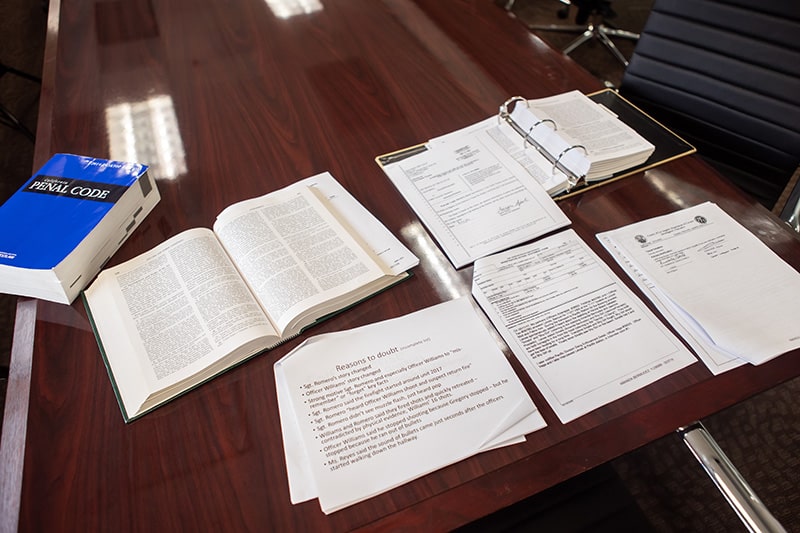How to Win a PC 664/187(a) Attempted Murder Case

To win an attempted murder case, your murder defense attorney must understand attempted murder law in California and how to apply it to the facts being presented in your specific situation. One of California’s top criminal defense lawyers, Aaron Spolin, uses proven strategies to win a case. His steps have been used many times with former clients to achieve success. (Every case is unique, and prior success is not a “guarantee” of the same outcome on a future case.)
Mr. Spolin explains how these strategies work:
- Filing Legal “Motions” Geared at Dismissing the Case or Excluding Evidence: A legal “motion” is a request that the court does something specific. It is possible to win a case based upon the arguments made in pre-trial motions that are filed before the trial even happens. If a motion to dismiss a case is granted, the defendant should be released immediately. When seeking to exclude evidence, your murder attorney is trying to get rid of key information that the prosecutor has against you. Motions present strong arguments to support the best outcome for your case.
- Using the Prosecutor’s Evidence Against Them: The prosecutor must prove beyond a reasonable doubt that you committed a crime. That is a very high standard to prove. Attorney Aaron Spolin and his team will utilize the discovery process to obtain evidence that the prosecutor intends to use against you. Then, they will poke holes in the evidence by scrutinizing how it was obtained, whether your rights were violated, and how it applies to the elements of attempted murder.
- Creating the Best Defense Strategy Possible: In an attempted murder trial, the jury will decide if you are guilty or not. Your defense attorney does not necessarily have to prove that you are innocent, but simply that you are not guilty. A skilled attempted murder lawyer will utilize defenses to point out that there is reasonable doubt that you committed a crime. With that reasonable doubt, you cannot be found guilty of attempted murder in California.
To learn more about how these strategies might apply to your case, call Mr. Spolin and his legal team, including attorney Don Nguyen and attorney Jeremy Cutcher at their law firm, Spolin Law P.C.: (310) 424-5816.
- How to Win a PC 664/187(a) Attempted Murder Case
- Understanding California Attempted Murder Laws
- Developing the Best Defenses to PC 664/187(a) Charges
- Your Attempted Murder Defense Team
Understanding California Attempted Murder Laws

In California, attempted murder is divided into two degrees under California Penal Code 664/187(a). First-degree attempted murder requires premeditation and willful actions. Second-degree attempted murder is a catch-all and includes anything that does not involve premeditation and willful actions.
What Is Attempted Murder?
Attempted murder is trying to kill another human being, but ultimately failing. There are two elements to this crime:
- The defendant took one or more direct (but ineffective) steps towards killing another person; and
- The defendant had intent to kill that person (called “malice aforethought”).
This is considered a violent crime, even if the intended victim is not actually harmed.
It should be noted that a fetus is considered a person for the purposes of PC 664/187(a).
What Is a Direct Step Towards Killing Another Person?
In the first element of attempted murder, a person must take a direct step towards killing another person. The fact that the step is ultimately unsuccessful does not negate the crime.
A direct step includes more than simple planning. It must involve actually putting a plan into motion. If an outside factor had not interfered, the murder would have occurred.
For example, buying a knife is not a direct step in attempting a murder, but stabbing someone in the chest with it is.
What Is Intention to Kill or Malice Aforethought?
A prosecutor must prove that the defendant had actual intent to kill the victim, not simply an intent to maim or injure the other person.
In the analysis of intent, the location of injuries caused by a defendant is important. For example, if the victim was stabbed in the leg, it will be hard for the prosecutor to prove intent to kill. By contrast, a stab wound in the upper body where vital organs are located might be evidence of intent to kill.
When there are no injuries that actually occurred, prosecutors rely on overall circumstances to show intent.
What if Someone Else is Killed Instead of the Intended Target?
Kill zone theory allows the prosecutor to charge a defendant for attempted murder even if they did not intent to kill the specific person who was harmed. Defendants are liable for anyone who is killed if they are attempting to kill an intended target. This applies even if the defendant did not know anyone else was in the kill zone.
For example, if a person shoots a gun into a residence with the intent to kill a specific person, but instead hits three other people, they may also be liable for those murders.
What Are the Penalties for Attempted Murder?
In general, the penalty for attempted murder is half of what the sentence would typically be for murder under PC 187.
- First-degree attempted murder can result in life in prison with the possibility of parole. Defendants must serve at least 15 years in prison if the victim was an on-duty police officer, firefighter, or another specified individual.
- Second-degree attempted murder can result in five, seven, or nine years in prison depending on the facts of the case.
Additional penalties include victim resolution, up to a $10,000 fine, loss of gun rights, and problems with immigration status up to and including deportation.
Does California’s Three Strikes Law Apply to Attempted Murder?
Yes. Since attempted murder is a violent felony, California’s three strikes law applies. A second strike results in a double sentence and a third strike results in 25 years to life in prison.
Gang-Related Attempted Murder
An attempted murder charge may be enhanced if it is street gang-related. That means the defendant will face an additional sentence of 15 years to life in prison, which runs consecutively with the attempted murder sentence.
Other Enhanced Penalties for Attempted Murder
If a gun is used in an attempted murder case, the 10-20-life “use a gun and you’re done” law (PC 12022.53) will apply. That means defendants may face an additional sentence of 10 years in prison for using a gun, 20 years for firing a gun, or 25-years-to-life for killing another person or causing great bodily injury while using a gun.
Other Crimes That May Be Charged with Attempted Murder
When a defendant is charged with attempted murder, prosecutors frequently add on as many other related charges as possible. Some common related charges include the following.
- Shooting at an inhabited dwelling or occupied car (PC 246)
- Drive-by shooting (PC 26100)
- Torture (PC 206)
- Attempted voluntary manslaughter (PC 192(a))
- Domestic violence
- Attempting to aid in a suicide (PC 401)
- Soliciting someone to commit a crime (PC 653f)
- Aggravated battery (PC 243(d))
- How to Win a PC 664/187(a) Attempted Murder Case
- Understanding California Attempted Murder Laws
- Developing the Best Defenses to PC 664/187(a) Charges
- Your Attempted Murder Defense Team
Developing the Best Defenses to PC 664/187(a) Charges
Some criminal defense attorneys have a templated way of defending cases. They are comfortable with certain arguments and use the same set of documents in court for every client. But Spolin Law P.C. looks carefully at the specific facts in your case and develops a strategic defense plan catered to your needs and goals.
Some of the best defenses to attempted murder include the following.
- No intent to kill (there may have been intent to maim or scare)
- No direct step was taken
- Mistaken identity
- Self-defense
- False accusation by the alleged victim
Our attempted murder lawyers may utilize one or more of these defenses to prove you are not guilty.
- How to Win a PC 664/187(a) Attempted Murder Case
- Understanding California Attempted Murder Laws
- Developing the Best Defenses to PC 664/187(a) Charges
- Your Attempted Murder Defense Team
Your Attempted Murder Defense Team

Although they aren’t murder charges, attempted murder accusations can be just as serious. You may even be facing life in prison along with a host of other penalties and consequences. You need the help of a California attempted murder lawyer who has a history of winning PC 664/187(a) trials.
Working with one of the best criminal defense teams at Spolin Law P.C. can make a difference.
- We understand the law and process. Attorney Aaron Spolin (Princeton, BA; UC Berkeley, JD) went to top-tier schools to learn about the law and uses his knowledge to help his clients through the legal process.
- We have a history of success. We know the law and understand how to use it to win cases. Our clients can testify that we aggressively fight to achieve success in every case.
- We fight until you win. Not only can we take your case to trial, but we are skilled at filing appeals and achieving post-conviction relief when necessary. We won’t just leave you hanging after a conviction. With the expected passing of SB 775, someone convicted may soon be eligible to apply to have their sentence vacated and resentenced.
If you have questions about your case, contact Mr. Spolin, Mr. Nguyen, or Mr. Cutcher at their law firm, Spolin Law P.C. Call today at (310) 424-5816.
